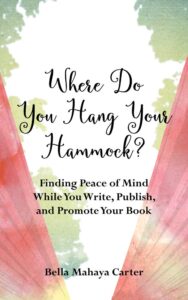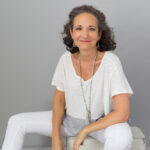 Today’s special guest is writer Bella Mahaya Carter. We’re chatting about her new self-help book, Where Do You Hang Your Hammock? Finding Peace of Mind While You Write, Publish, and Promote Your Book.
Today’s special guest is writer Bella Mahaya Carter. We’re chatting about her new self-help book, Where Do You Hang Your Hammock? Finding Peace of Mind While You Write, Publish, and Promote Your Book.
Look for details for the virtual book launch happening on June 3, below.
Bio:
Bella Mahaya Carter is an author, creative writing teacher, and empowerment coach, who helps writers experience peace of mind from inspiration to publication and beyond. She believes in the power of writing to heal and transform lives, and views publishing as an opportunity to deepen self-awareness, nourish meaningful connections, and delight in peak experiences while being of service. She is the author of an award-winning memoir, Raw: My Journey from Anxiety to Joy, and Secrets of My Sex, a collection of narrative poems. Carter has worked with hundreds of writers since 2008, and has degrees in literature, dance, film, and spiritual psychology. Her writing has appeared in dozens of print and online journals.
Please tell us about your current release.
An invaluable resource for writers, Where Do You Hang Your Hammock? debunks the myth that anxiety is the price of admission to a creative life. Inspiring and practical, this guidebook—divided into five parts: Dream, Nourish, Write, Publish, and Promote—shows writers how to use their present-moment circumstances as stepping-stones to a successful and meaningful writing life, navigated from the inside out. It encourages writers and authors to rethink their ambitions (which may be fueled by the tyrannical demands of the ego) and trust in their heartfelt purpose and values in the journey to becoming, or continuing on, as authors.
Many writers believe their self-sabotaging thoughts are trustworthy and true. They take rejection personally. They surmise that if they don’t achieve their goals they have failed, and lose sight of who they are and what matters most.
This book is for writers looking for inspiration and for authors daunted by the publishing process, who might lack the requisite author platform to get published the way they dreamed, or whose careers may not be unfolding as expected. It aims to be the friend and trusted expert writers turn to when hijacked by their own thinking. Ultimately, it reminds authors that they are infinite creators.
What inspired you to write this book?
Over the past decade, I’ve been blogging about personal transformation and growth for writers. I felt compelled to revisit and update that material to share what I’ve learned about liberating writers from doubts, fears, self-sabotage, and the mental strife that comes from navigating the inner critic, as well as the vagaries and frustrations of the publishing industry. What I found after chronicling hundreds of posts was that most of them fell into one of five categories: dream, nourish, write, publish, and promote. When you assemble blog posts thematically, rather than chronologically, each piece informs the others in ways that reinforce, expand, and recast your material.
Excerpt from Where Do You Hang Your Hammock?
Chapter 4: An End to Striving
We writers are an ambitious lot. We write books, blogs, and articles; build platforms; read voraciously; navigate rocky inner and outer terrain; attend conferences and workshops; and invest huge amounts of time, energy, and money in our work. We are passionate. Some of us take jobs to support our families and our writing habit. Hours slip away while we toil at our craft. This is all fine—until it isn’t.
Many of us believe happiness and satisfaction will be ours when we achieve a certain writing goal. I don’t know about you, but soon after I achieve one writing goal, another pops up and takes its place. I’ve noticed this pattern in other areas of my life as well. A desire arises in my mind, and that’s fine, but then I attach and cling to it, until suddenly, without my realizing it, my desire has turned into a craving that has control over me. I start working harder and harder to satisfy an unidentifiable hunger.
I’m at its mercy—until I wake up and let myself feel my hunger. I sit with it, lean in, and resist the urge to push it away. Detaching from results helps. Barb Patterson, international executive coach, calls this a “return to zero.” You let go, recalibrate, and try to place “nothing on it.” In other words, don’t make your goal mean anything about you. Your goal is not you. It doesn’t define you. Don’t fuse your self-worth with your achievements. One thing has nothing to do with the others. Self-worth isn’t something that has to be earned. It’s inherent. We are all worthy.
Most of us get this—mentally. As ideas. But grasping concepts is not the same thing as insight, or sight from within.
Striving is like being a rat on a wheel. It’s unending. Like the rat, we sometimes go way too fast and spin ourselves into a tizzy. At this point, it’s best to get off the wheel. Stop spinning. Release ourselves from the cage of our own making.
Freedom from striving comes when we let go of outcomes. It comes when we realize our job is to show up, do our work, resist the urge to judge it or ourselves, and fling ourselves, heart first, into the wind. The challenge is to trust that the universe supports us whether we fly or plunge. Though most of us would rather soar than collapse, both are worthwhile experiences. It’s what we think about them that gets us into trouble.
Striving for something or someone may bring momentary joy, but it’s a mistake to think anything “out there” will bring genuine, lasting happiness.
When they get really honest about it, many of my students and clients admit that what fuels their striving is the (mis)belief that they are not good enough. Wiggling in that can of worms are fears of letting people down, of being an imposter, of not measuring up. When I work with people who find themselves in this mindset, I suggest that they flood themselves with as much love and compassion as possible. I invite them to visualize a loving mother holding her baby in her arms. A baby doesn’t earn its mother’s love. Again, it’s inherent. Imagine that kind of love. Feel it. Receive it. This love is available to you now whether you experienced it as an infant or not.
So step off the treadmill. Imagine the places and times in your life when you felt cherished. Call to mind those people, thoughts, and feelings. Inhale their sweetness. And then place your hand over your belly and breathe. This will bring you back to the present moment, back to what’s real.
Stop striving to be important. You already are.
What exciting story are you working on next?
When I started working with my publicist, in addition to handing over several articles, I promised to send a list of other ideas that she could pitch to media. I put this task off for weeks, and then one day, I rolled up my sleeves and got to work, raiding my files and notes. I excavated forty-three article ideas that I’ve been exploring in my journal and on my computer this past year. When I reviewed my list, which was more comprehensive than I’d imagined, I realized that each of those ideas could be expanded into a book chapter. It occurred to me that perhaps I had (without realizing it) starting outlining my next book, which continues on the themes I’ve introduced in Where Do You Hang Your Hammock? Creativity is like this. If you show up and listen, projects creep up on you. They announce themselves, express what they want from you, and tell you what they want to be. I’m still listening—and I’m excited!
 When did you first consider yourself a writer?
When did you first consider yourself a writer?
I first considered myself a writer after graduating from film school, where I’d earned an MFA in filmmaking with an emphasis in screenwriting. During that time I’d been working on a screenplay, which wasn’t going anywhere, so I signed up for a UCLA adult extension class in poetry with Jack Grapes. In the five years I studied with Jack my identity as a writer blossomed. Since then I’ve come to understand that I am much more than a writer. Being a writer is something I do; it is not who I am. And this is true for us all; we are larger than the roles we play or the work we do.
Do you write full-time? If so, what’s your work day like? If not, what do you do other than write and how do you find time to write?
In addition to writing, I’m a creative writing teacher and empowerment coach. This work comes very naturally, and is surprisingly creative. I never know what will unfold. I meet clients and students the way I meet a blank page, with openness and wonder, eager to explore what’s possible. It’s a tender, sacred, and joyful process. Helping to liberate writers from thinking that holds them back, inspires me. Human potential is so much larger than we imagine.
I don’t have to “find” the time to write; it finds me. I love to write. —But not always. Sometimes I get busy, or avoid it, but I’ve learned to appreciate the fact that life includes ebbs along with flows. I respect both. When I return to writing after a break, it feels like I’ve come home.
What would you say is your interesting writing quirk?
I sometimes get so excited by an idea that I jump out of bed in the morning and hurry to my desk to write it down before doing anything else—like getting dressed! So I sit naked at my computer, or with a towel around my waist if the idea struck me in the shower, hammering away at the keyboard. I suppose it’s good that trees block my floor to ceiling window so people walking their dogs can’t see my “interesting writing quirk.”
As a child, what did you want to be when you grew up?
A doctor. I don’t know if this is because deep down I knew I was a healer, which I am, in psycho-spiritual realms, or if it was because I wanted to achieve something important and worthwhile, and make a valuable contribution to society.
Anything additional you want to share with the readers?
I’m having a virtual book launch for Where Do You Hang Your Hammock? on Thursday, June 3rd, at 4:00 p.m. PT. I’m going to be in conversation with renowned author advocate and publisher, Brooke Warner. We’ll be talking about how to cultivate peace of mind, what to do if your writing career isn’t unfolding according to your expectations and dreams, how to create success from the inside out, and more. This event is open to the public, but you must register here. We’ll be raffling off books and a hammock.
Links:
Website | Facebook Profile Page | Instagram | Facebook Author Page | Twitter | LinkedIn | Vimeo | YouTube
Thanks for being here today, Bella.
Thanks for having me!
